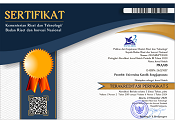Studi Literatur Digitalisasi Model 5A untuk Pengendalian Obesitas Saat Pandemi COVID-19
Abstract
Keywords
Full Text:
PDF (Bahasa Indonesia)References
Ashby N. (2020). Impact of the COVID-19 Pandemic on Unhealthy Eating in Populations with Obesity. Obesity (Silver Spring, Md.), 28(10), 1802–1805. https://doi.org/10.1002/oby.22940
Kim Eunjoo, et al. 2020. Application of Machine Learning to Predict Weight Loss in Overweight, and Obese Patients on Korean Medicine Weight Management Program. The Journal of Korean Medicine ; 41(2) 58- 79. Retrieved from https://doi.org/10.13048202 0.41.58
Middelweerd A, Mollee JS, van der Wal CN, Brug J, Te Velde SJInt J Behav Nutr Phys Act. (2014). Apps to promote physical activity among adults: a review and content analysis, 11;97.
Conroy DE, Yang CH, Maher JPAm J Prev Med. (2014). Behavior change techniques in top-ranked mobile apps for physical activity. Jun; 46(6):649-52.
Bhuyan, Soumitra & Lu, Ning & Chandak, Aastha & Kim, Hyunmin & Wyant, David & Bhatt, Jay & Kedia, Satish & Chang, Cyril. (2016). Use of Mobile Health Applications for Health-Seeking Behavior Among US Adults. Journal of Medical Systems. 40. 10.1007/s10916-016-0492-7.
Breton ER. (2011). Weight loss-there is an app for that, But does it adhere to evidence-informed practices,Fuemmeler BF, Abroms LC Transl Behav Med. Dec; 1(4):523-9.
Butryn, M.L., Phelan, S., Hill, J.O. and Wing, R.R. (2007), Consistent Self‐monitoring of Weight: A Key Component of Successful Weight Loss Maintenance. Obesity, 15: 3091-3096.
Charles T. (2013). Communication model elements for societal behavior representation using agent based models, TSYS School of Computer Science, Colombus State University
Drewnowski A, Bellisle F. (2007). Liquid calories, sugar, and body weight. Am J Clin Nutr ;85: 651–61.
Fabian Sanchis-Gomar, MD, PhD. (2020). Obesity and Outcomes in COVID-19: When an Epidemic and Pandemic Collide.
Kementrian Kesehatan RI. (2018). Factsheet Obesitas, Informasi Obesitas, hal 2.
Garg S, Kim L, Whitaker M, et al. (2020). Hospitalization rates and characteristics of patients hospitalized with laboratory‐confirmed coronavirus disease 2019 - COVID‐NET, 14
states, March 1-30, 2020. MMWR Morb Mortal Wkly Rep. ;69:458‐464.10.15585/mmwr.mm6915e3.
Hernández, Lourdes López, et all. (2020). Improved Nutritional Knowledge in the Obese Adult Population Modifies Eating Habits and Serum and Anthropometric Markers. Nutrients, 12, 3355; doi:10.3390/nu12113355
Hootsuite and We Are Social. (2020). Digital in 2020 : Essential Insights Into Internet, Social Media, Mobile, and E-Commerce Use Around The World.
Kabbaoui, M.E., et al. (2018). Prevalence of and risk factors for overweight and obesity among adolescents in Morocco. EMHJ Vol. 24 No.6
Kementrian Kesehatan RI. (2018). EPIDEMI OBESITAS.
Kementrian Kesehatan RI. (2018) Hasil Utama Riskesdas. hal 89-90.
Lanigan, J, Collins, S, Birbara, T et al. (2013). The TrimTots programme for prevention and treatment of obesity in preschool children: evidence from two randomised controlled trials. Lancet 382, 58.
Lachat C, Nago E, Verstraeten R, Roberfroid D, Van Camp J, Kolsteren P. (2012). Eating out of home and its association with dietary intake: a systematic review of the evidence. Obesity Rev 13:329-46.
Leandro Fornias Machado de Rezende et al. (2014). Sedentary Behavior and Health Outcomes: An Overview of Systematic Reviews.
Lighter J, Phillips M, Hochman S, et al. (2020). Obesity in patients younger than 60 years is a risk factor for Covid‐19 hospital admission. Clin Infect Dis. 71(15):896‐897.
Makbuloh, D. (2011). Quality Management of Islamic Education, Model Development of Theory and Application of Quality Assurance Systems, Cet. I;Jakarta: PT. Rajagrafindo Persada.
Mhurchu, C.N., et all. (2018). Do nutrition labels influence healthier food choices? Analysis of label viewing behaviour and subsequent food purchases in a labelling intervention trial. Appetite, Volume 121. Retrieved from https://doi.org/10.1016/j.appet.2017.11.105.
Montesi L, El Ghoch M, Brodosi L, Calugi S, Marchesini G, Dalle Grave R. (2016). Long-term weight loss maintenance for obesity: a multidisciplinary
approach. Diabetes Metab Syndr Obes. 9:37-46
Ng M, Fleming T, Robinson M, et al. (2014). Global, regional, and national prevalence of overweight and obesity in children and adults during 1980-2013: a systematic analysis for the Global Burden of Disease Study 2013. Lancet. 384(9945):766-781.doi: 10.1016/S0140-6736(14)60460-8.
Payne H.E., Lister C., West J.H., Bernhardt J.M. (2015). Behavioral functionality of mobile apps in health interventions: A systematic review of the literature. JMIR mHealth uHealth. 3 doi: 10.2196/mhealth.3335.
Pranajaya, & Hendra Wicaksono. (2017). Pemanfaatan Aplikasi WhatsApp (WA) Di Kalangan Pelajar (Studi kasus Di MTs Al Muddatsiriyah dan MTs jakarta Pusat). Prosiding SNaPP2017 Sosial, Ekonomi, Dan Humaniora, Vol 7, No.1, 98–109.
Rahartri. (2019). “Whatsapp” Media Komunikasi Efektif Masa Kini (Studi Kasus Pada Layanan Jasa Informasi Ilmiah Di Kawasan Puspiptek).Visi Pustaka Vol. 21, No. 2,
Royal Australian College of General Practitioners. (2016). Guidelines for preventive activities in general practice. 9th ed. RACGP, Editor. East Melbourne.
S.B. Heymsfield, T.A. Wadden. (2017). Mechanisms, pathophysiology, and management of obesity N Engl J Med, 376 , p. 1492
Shepherd R. (2007). Social determinants of food choice. Proc Nutr Soc . 58:807–12.
Singh, B., & Tawfik, H. (2020). Machine Learning Approach for the Early Prediction of the Risk of Overweight and Obesity in Young People. Computational Science – ICCS 2020: 20th International Conference, Amsterdam, The Netherlands, June 3-5, Proceedings, Part IV, 12140, 523-535. Retrieved from https://doi.org/10.1007/978-3- 030-50423-6_39
S. O’dea (2016). Number of smartphone users worldwide from 2014 to 2019.Statistica. Retrieved from http://www.statista.com/statistics/330695/number-of smartphone-users-worldwide/. Accessed 8 Mar 2017
Valentin Ayala R, Bernstein J. (2020). Changing Weight Management Self-efficacy Among Obese Puerto Rican Adults: A Quantitative Study using a Health Coaching Intervention. The Internet Journal of Allied Health Sciences and Practice. p 10;18(1), Article 9
Valentini Konstantinidou, MSc, PhD. (2017). Food Coaching: A New Methodology for an Old Problem. Nutritional Genomics Specialist and Accredited Practitioner Coach (IIC&M), Spain.
Vallis, M., Piccinini-Vallis, H., Sharma, A. M., & Freedhoff, Y. (2013). Clinical review: modified 5 As: minimal intervention for obesity counseling in primary care. Canadian family physician Medecin de famille canadien, 59(1), 27–31.)
Xiang M., Zhang Z., Kuwahara K. (2020). Impact of COVID-19 pandemic on children and adolescents’ lifestyle behavior larger than expected. Prog. Cardiovasc. Dis. doi: 10.1016/j.pcad.2020.04.013.
Yu et al. (2018). JACC Health Promotion Series. Cardiovascular Disease Prevention by Diet Modification. 917
Zhao J., Freeman B., Li M. (2016). Can mobile phone apps influence people’s health behavior change? An evidence review. J. Med. Int. Res.18 doi: 10.2196/jmir.5692.
Zheng K.I., Gao F., Wang X.B. (2020). Obesity as a risk factor for greater severity of COVID-19 in patients with metabolic associated fatty liver disease. Metabolism. 108.
DOI: https://doi.org/10.24167/praxis.v4i1.3382
View My Stats | ISSN 2622-9137 (media online)







